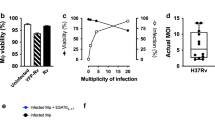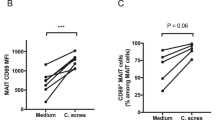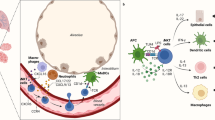Abstract
Human immunodeficiency virus (HIV) is implicated in the development of AIDS (acquired immune deficiency syndrome)1,2. HIV infection leads to the generation of HIV-specific thymus-derived (T) lymphocytes in humans3,4 and apes5. We describe an experimental system permitting the quantitative and systematic analysis of HIV-specific cytotoxic T lymphocytes (CTL). Functional, HIV-specific CTL are obtained by broncho-alveolar lavage (BAL) from the lungs of seropositive patients with lymphocytic alveolitis6. These alveolar CTL: (1) recognize and kill HIV-infected alveolar macrophages in vitro under autologous, but not heterologous, conditions; (2) correspond to standard CTL as they express the CD3 and CDS surface markers, but not the CD4 marker; and (3) are restricted by class I HLA transplantation antigens in their cytotoxic activities. We propose the hypothesis that interactions between HIV-specific CTL and infected macrophages induce major inflammatory reactions in seropositive patients.
This is a preview of subscription content, access via your institution
Access options
Subscribe to this journal
Receive 51 print issues and online access
$199.00 per year
only $3.90 per issue
Buy this article
- Purchase on Springer Link
- Instant access to full article PDF
Prices may be subject to local taxes which are calculated during checkout
Similar content being viewed by others
References
1. Barre–Sinoussi, F. et al. Science 220, 868–871 (1983). 2. Gallo, R. C. et al. Science 220, 865–867 (1983). 3. Walker, C. M. et al. Science 234, 1563–1566 (1986). 4. Zagury, D. et al. Nature 326, 249–250 (1987). 5. Zarling, J. M. et al. Nature 323, 344–346 (1986). 6. Chayt, K. J. et al. J. Am. Med. Assn 256, 2356–2359 (1986). 7. Gartner, S. et al. Science 233, 215–219 (1986). 8. Wallace, J. M. et al. Am. Rev. Respir. Dis. 130, 786–790 (1984). 9. Young, K. R. et al. Ann. intern. Med. 103, 522–533 (1985). 10. Venet, A. et al. Bull Eur. Physiopathol. Respir. 21, 535–543 (1985). 11. Ziza, J. M. et al. N. Engl. J. Med. 313, 183 (1985). 12. Salahuddin, S. Z. et al. Blood 68, 281–284 (1986). 13. Chassagne, J. et al. J. Immun. 136, 1442–1445 (1986). 14. Calvo, C. F. et al. J. Immun. 132, 2345–2349 (1984). 15. Gomard, E. et al. Nature 319, 153–154 (1986). 16. Wong–Staal, F. & Gallo, R. C. Nature 317, 395–403 (1985). 17. Alizon, M. et al. Nature 312, 757–760 (1984). 18. Hunninghake, G. W. Am. Rev. Respir. Dis. 129, 569–572 (1984). 19. Pinkston, P. et al. N. Eng. J. Med. 308, 793–800 (1983). 20. Shaw, G. M. et al. Science 227, 177–182 (1985). 21. Gartner, S. et al. J. Am. Med. Assn. 256, 2365–2371 (1986). 22. Vieira, J. & Messing, J. Gene 19, 259–268 (1982). 23. Plata, F. et al. Cell 48, 231–240 (1987). 24. Colbere–Garapin, F. et al. J. molec. Biol. 150, 1–14 (1981). 25. Reinherz, E. L. & Schlossman, S. F. Cell 19, 821–827 (1980). 26. Malissen, B. et al. Eur. J. Immun. 12, 739–747 (1982). 27. Plata, F. J. Immun. 134, 1312–1319 (1985). 28. Maniatis, T. et al. Molecular Cloning: a Laboratory Manual (Cold Spring Harbor Laboratory Pubications, Cold Spring Harbor, 1982).
Author information
Authors and Affiliations
Rights and permissions
About this article
Cite this article
Plata, F., Autran, B., Martins, L. et al. AIDS virus-specific cytotoxic T lymphocytes in lung disorders. Nature 328, 348–351 (1987). https://doi.org/10.1038/328348a0
Received:
Accepted:
Issue Date:
DOI: https://doi.org/10.1038/328348a0
This article is cited by
-
HIV induces airway basal progenitor cells to adopt an inflammatory phenotype
Scientific Reports (2021)
-
HIV associated Lymphocytic Interstitial Pneumonia: a clinical, histological and radiographic study from an HIV endemic resource-poor setting
BMC Pulmonary Medicine (2015)
-
Host hindrance to HIV-1 replication in monocytes and macrophages
Retrovirology (2010)
-
The role of IFN-γ Elispot assay in HIV vaccine research
Nature Protocols (2009)
-
High frequencies of polyfunctional HIV-specific T cells are associated with preservation of mucosal CD4 T cells in bronchoalveolar lavage
Mucosal Immunology (2008)
Comments
By submitting a comment you agree to abide by our Terms and Community Guidelines. If you find something abusive or that does not comply with our terms or guidelines please flag it as inappropriate.



